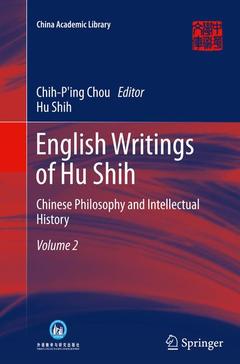Description
English Writings of Hu Shih, 2013
Chinese Philosophy and Intellectual History (Volume 2)
China Academic Library Series
Language: English
Subject for English Writings of Hu Shih:
Publication date: 03-2015
Support: Print on demand
Publication date: 02-2013
306 p. · 15.5x23.5 cm · Hardback
Description
/li>Contents
/li>Biography
/li>Comment
/li>
Hu Shih (1891-1962),. In the 1910s, Hu studied at Cornell University and later Columbia University, both in the United States. At Columbia, he was greatly influenced by his professor, John Dewey, and became a lifelong advocate of pragmatic evolutionary change. He received his Ph.D. in Philosophy in 1917 and returned to lecture at Peking University. Hu soon became one of the leading and most influential intellectuals during the May Fourth Movement and later the New Culture Movement. His most widely recognized achievement during this period was as a key contributor to Chinese liberalism and language reform in his advocacy for the use of written vernacular Chinese. Hu Shih was the Republic of China?s Ambassador to the United States of America (1938-1942) and later Chancellor of Peking University (1946-1948). In 1939 Hu Shih was nominated for a Nobel Prize in literature and in 1958 became president of the ?Academia Sinica? in Taiwan, where he remained until his death in Nangang at the age of 71.
This diverse collection brings together his English essays, speeches and academic papers, as well as book reviews, all written between 1919 and 1962. English Writings of Hu Shih represents his thinking and insights on such topics as scientific methodology, liberalism and democracy, and social problems. It can also serve as a helpful resource for those who study Hu Shih and his views on ancient and modern China.
The first volume ?Chinese Philosophy and Intellectual History? allows readers to trace the development of Chinese thought and see the historical methodology applied therein. The second volume ?Literature and Society? mainly includes Hu Shih?s works on language reform, which owing to his advocacy for the use of written vernacular Chinese were a success in both the educational and literary fields. The third volume ?National Crisis and Public Diplomacy?mainly collects Hu?s articles and speeches from his term as Ambassador of China to the U.S.A. between 1938 and 1942.
Intellectual China in 1919.- Buddhist Influence on Chinese Religious Life.- The Renaissance in China.- The Civilizations of the East and the West.- Wang Mang, the Socialist Emperor of Nineteen Centuries Ago.- Conflict of Cultures .- The Establishment of Confucianism as a State Religion During the Han Dynasty.- Confucianism.- Religion and Philosophy in Chinese History.- Development of Zen Buddhism in China.- Types of Cultural Response.- Social Changes in China.- The Indianization of China: A Case Study in Cultural Borrowing.- A View of Immortality.- Historical Foundations for a Democratic China.- The Exchange of Ideas Between the Occident and the Orient: A Case Study in Cultural Diffusion.- India Our Great Teacher.- The Struggle for Intellectual Freedom in Historic China.- The Concept of Immortality in Chinese Thought.- Chinese Thought.- The Natural Law in the Chinese Tradition.- Ch’an (Zen) Buddhism in China: Its History and Method.- Authority and Freedom in the Ancient Asian World.- Yung Wing: One Hundred Years After His Graduation.- The Right to Doubt in Ancient Chinese Thought.- The Scientific Spirit and Method in Chinese Philosophy.- An Appeal for a Systematic Search in Japan for Long-Hidden T’ang.- Dynasty Source-Materials of the Early History of Zen Buddhism.- Social Changes and Science.




